Play This, Not That: Eternal Sonata Vs. Tales of Symphonia
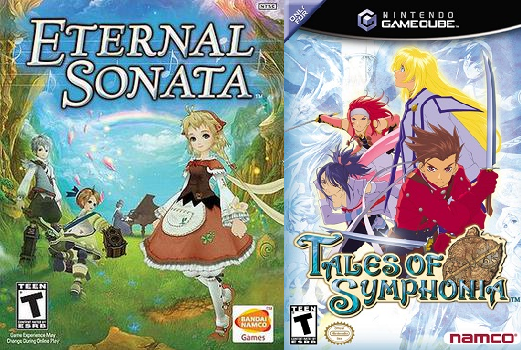 Despite appearing similar on the surface (JRPGs from the 2000's published by Bandai Namco with musical-sounding titles), these two games have very different design philosophies. One largely succeeds, while the other one doesn't.
Despite appearing similar on the surface (JRPGs from the 2000's published by Bandai Namco with musical-sounding titles), these two games have very different design philosophies. One largely succeeds, while the other one doesn't.Disclaimers
- I'll be avoiding all spoilers in this post, aside from one video that you can skip.
- My opinions below aren't meant to serve as a full review for each game, so I may generalize for the sake of brevity.
Introduction: a Tale of Two JRPGs
With a lack of notable RPG releases this year due to the COVID-19 pandemic, my fiancée and I decided to tackle some of the games in our backlog.
As a lifelong Tales Of Series fan, my fiancée had been itching to play Tales of Symphonia, an action-oriented JRPG for the Gamecube. Originally published by Bandai Namco in 2004, it's seen several re-releases since then: it was ported to the PS2, then to the PS3, and then finally to PC.
I, on the other hand, had a weird curiosity for Eternal Sonata, a JRPG for the Xbox 360 (and later PS3). This game was also published by Bandai Namco, and was released in 2007 (and later ported to the PS3 in 2008).
Interestingly, both of these games offer local co-op: a second player can control one of the party members during battle. So, as closet lovers of anime melodrama and cliched romances, what did we do? We played both of them, of course! What did we think of them? Read on to find out!
Tales of Symphonia: Woefully Out of Tune
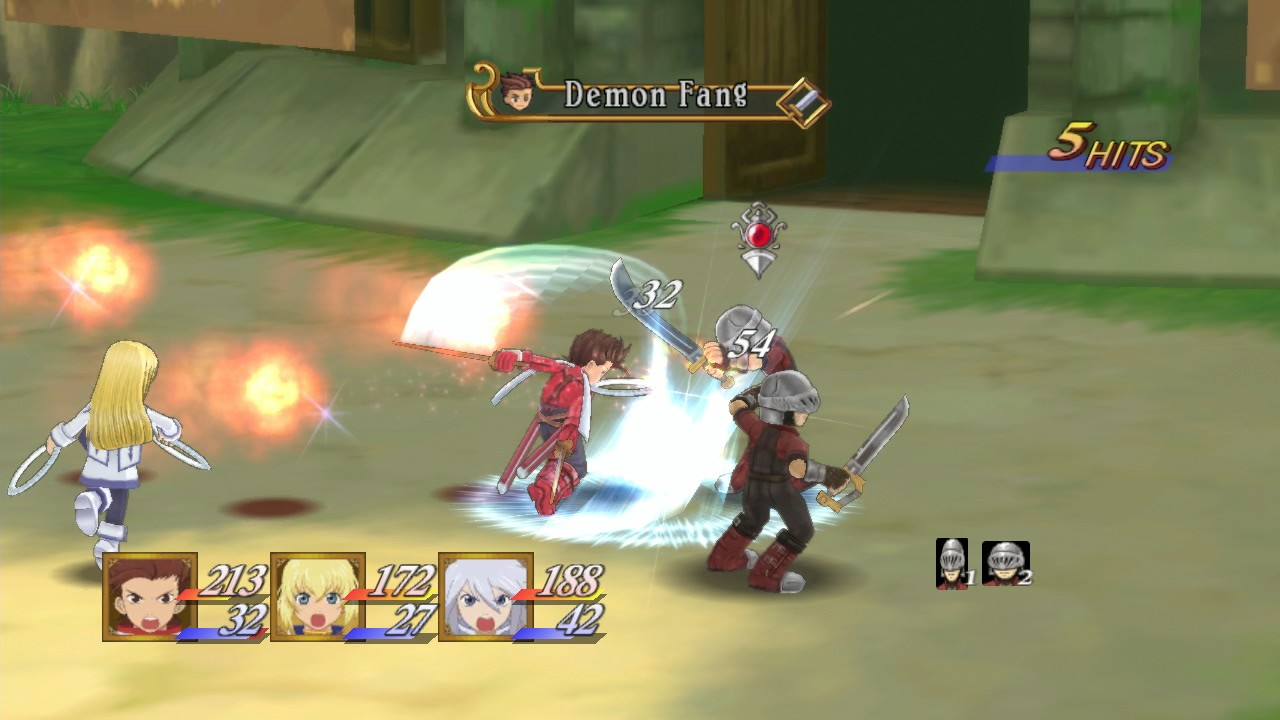 Tales of Symphonia's battle system is fast and fun, but that's probably it's biggest (and only) strength. Image Credit: RPGSite
Tales of Symphonia's battle system is fast and fun, but that's probably it's biggest (and only) strength. Image Credit: RPGSite
Let me set the stage: my fiancée and I were absolutely pumped to play this game. It consistently ranks very highly on "Best Of Tales Series" lists such as this one, where it's ranked as the 2nd best Tales game of all time. Owing to its constant online praise, we were eager to get this Symphonic party started.
Having said that, we also knew that we'd have to temper our expectations. The game is over 15 years old: game design, art, and graphics have dramatically improved since 2004. We wanted to give this game a fair chance, so we tried to keep its age in mind.
But despite our best attempts to play the game as if we were Caprisun drinking, yogurt yogurt slurping preteens in the 2000's, we both quickly realized that this game has not aged well.
This isn't to say that the game is irredeemable. It has its strengths, such as:
- It's fast, fluid, and fun real-time battle system.
- The chemistry between the characters during random conversations (called "skits" in Tales parlance). It's fun to watch the main cast bicker and banter over trivial things. This is where Symphonia's cast shines, as these are the only times in the game where the characters seem human.
- An interesting narrative premise, in theory.
But as a cohesive whole, the game is massively flawed. It's tedious, frustrating, and outright disrespectful to the player's time. While there are many issues with this game, I would summarize it as one main critique: a linear experience with no hook.
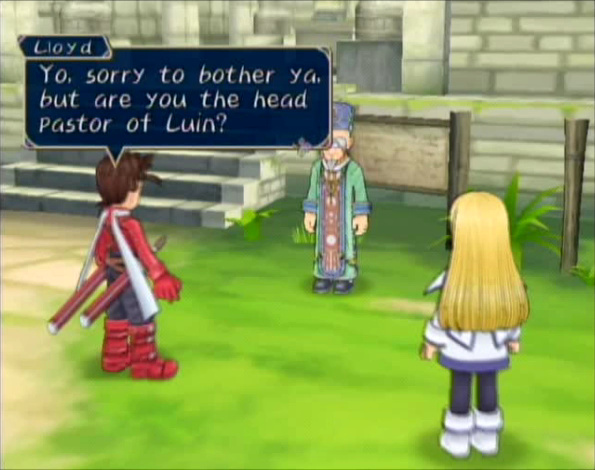 When playing Tales of Symphonia, expect lots and lots of awkward, boring dialog as you get shuttled from town to town. Don't be fooled by the game's opening, either: roughly half of the game's dialog isn't voice-acted.
When playing Tales of Symphonia, expect lots and lots of awkward, boring dialog as you get shuttled from town to town. Don't be fooled by the game's opening, either: roughly half of the game's dialog isn't voice-acted.
"Linear" RPGs, or ones that restrict exploration and player freedom, get a bad rap in Western circles. Many of us are used to huge, open-ended RPGs that actively encourage exploring and getting diverted off the main path (Elder Scrolls, Fallout, etc). As a result, we tend to complain when RPGs restrict our freedom. Whether its deserved or not, JRPGs are stereotyped as linear experiences, and some unfairly equate that to "JRPGs are bad".
I'd argue that linearity isn't necessarily a bad thing: many great games use linearity to craft focused, memorable experiences for the player. Halo, Call of Duty, God of War, Uncharted, Final Fantasy, and Paper Mario are all of examples of single-player experiences that don't allow for much unguided exploration, and are undoubtedly some of the greatest games ever made.
But for linear game designs to pay off, there needs to be a "hook". Whether that hook is gameplay (i.e. exciting action sequences), story-driven (i.e. cutscenes, major plot events), or something else, the game needs to be able to entice the player to go along with its linear structure.
For example, Zelda games reward players for completing dungeons (which are fun on their own) with cool items, interesting plot developments, and lore revelations. Halo rewards players for completing its objectives with bad-ass cutscenes and impressive in-game set-pieces. Linear games need these hooks, and without something to compel the player into following along, games tend to start feeling like chores rather than games.
Despite its fun battle system, Tales of Symphonia definitely lacks any kind of hook. As a story-driven RPG, the game's presentation fails for a number of reasons:
- The Story: it's interesting in theory, but its execution is an absolute mess. I won't attempt to summarize the game's story here because that would be impossible. The game's narrative is simply too convoluted. In addition, the game attempts to tackle themes like Sacrifice, Betrayal, Genocide, and Legacies, but fails to convey any of them well.
- The Backtracking: Symphonia often forces the player to march back and forth (and sometimes back again) between towns. I wouldn't even call these "fetch quests" because there's often no battling involved. Your reward for this is story exposition dumps and dialog-heavy cutscenes. My suspicion is that this was done to pad out the game's length so it could claim "40 hours of gameplay" on the back of its box.
- The Cutscenes: speaking of cutscenes, the game's voice-acted dialog ranges from inoffensive to painful, and characters are either stiffly animated or not at all. It's common to see a character's smiling face in the background of a serious cutscene, and it looks ridiculous.
- The Script: the game's script is too on-the-nose, and is very awkward to hear out loud. Characters constantly explain their feelings and motivations (violating the Golden Rule of Storytelling, "Show, don't Tell"), which makes them seem robotic and unnatural. Villains are laughably one-note, calling the main cast "Inferior Beings" at every opportunity.
At this point, you may be wondering, "Why are you harping over this game's presentation? Does it really matter as long as it's fun to play?" Well, it matters because when playing Symphonia, you'll be reading/listening more than you'll be RPG-ing.
I'd estimate that the majority of my time with Symphonia was spent pressing "A" to advance text, rather than traversing dungeons, battling enemies, or doing RPG-esque inventory management. This is fine on its own, but pure torture when you're playing a game with a presentation as terrible as Symphonia's.
Therefore, because Symphonia places so much of its worth on its presentation, the game falls flat. And being produced in 2004 is no excuse: if they didn't have the technology or budget to produce a game with a good story, voice acting, or animation, then they shouldn't have attempted to make a game mostly comprised of cutscenes.
Okay, so the game fails to hook the player with its presentation. But this is a videogame! Surely the game is fun to play?
Not exactly. As mentioned above, the battle system is fun in small sessions, but it collapses under the weight of the game's awful dungeon design, which consists of:
- Hoards of respawning enemies that pose little threat, making each battle feel unrewarding.
- Unimaginative puzzles that you've already seen in a million other games. Sliding block puzzles, liquid-running-down-pipe puzzles, raise/lower water-level puzzles, you name it, it's here. None of them are fun or imaginative.
- Dungeons require a hefty amount of back-tracking and are maze-like in design, which exacerbates the points above.
- You will be underleveled when you fight bosses for the first time, so make sure you put aside even more time for grinding.
 Do you like sliding block puzzles? If so, then you're in luck! Tales of Symphonia is filled with unimaginative puzzles like this.
Do you like sliding block puzzles? If so, then you're in luck! Tales of Symphonia is filled with unimaginative puzzles like this.
Because of the aforementioned backtracking, over-leveled bosses, and respawning enemies, battles become more of an annoyance than something to enjoy. In fact, I found myself avoiding battles simply so I could get through dungeons as fast as possible (exacerbating the boss problem). And when I'm avoiding battles, lamenting having to endure time-wasting puzzles, and dreading boss battles (and the ensuing grind required to progress), there's nothing that a fun battle system could ever do to save this game.
Therefore, with a lack of any compelling hook in either the game's presentation or its battle system, the game becomes a chore to play. This is a shame because there seems to be a lot of people that love this game. Maybe I'm missing something? Or maybe it's nostalgia, and I simply didn't drink enough Caprisuns? I'll never know for sure.
Nevertheless, my advice is: don't play this game unless you want a history lesson for the Tales series. Doubly so if you're looking for an entry point in the Tales franchise: the games that came after this are objectively better in almost every way (i.e. Tales of Vesperia or Tales of the Abyss), and there's no story continuity between games to worry about.
My Rating: 2 Inferior Beings out of 5
Eternal Sonata: a Flawed, yet Refreshing, Change of Tempo
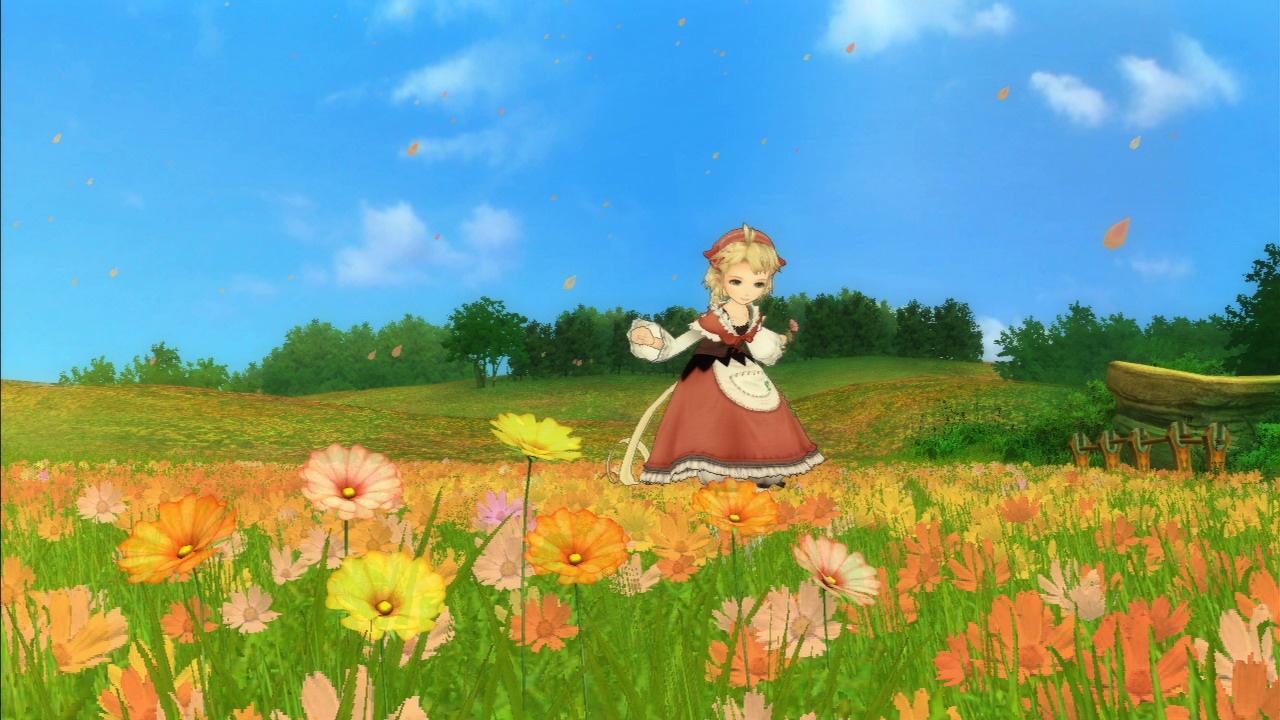 This game is far from perfect, but its presentation is absolutely beautiful at times.
This game is far from perfect, but its presentation is absolutely beautiful at times.
In contrast to Symphonia's dedicated online following, not many people seem to care for, or even remember, Eternal Sonata. The game is rarely discussed in forums and gaming news sites, and none of our gaming friends had ever even heard of it. This may be due to the fact that, despite being a highly-anticipated game before its release, the game received lukewarm reviews by both players and critics. Even so, I wanted to give this game a shot because it seemed different.
For those who haven't heard of this game, here's a basic summary: Frederic Chopin, the brilliant (real-life) piano composer, is dying, and the entirety of the game takes place in his dreams as he lies on his deathbed. The player takes control of a group of characters, including Chopin, that try to make sense of this fantastical, yet cruel, dream world. Much like its premise, the game's presentation takes on a fantastical, ethereal look that is, at times, amazing to witness.
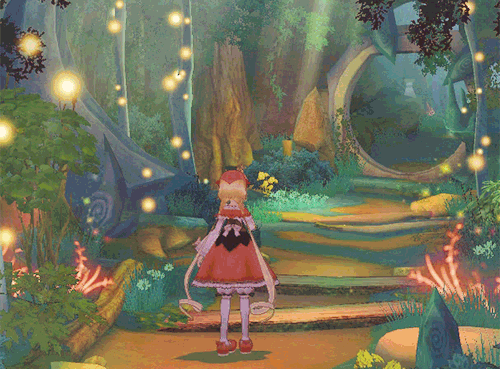 Despite its age, the game has a attractive, storybook quality, which lends itself well to the game's dreamworld motif.
Despite its age, the game has a attractive, storybook quality, which lends itself well to the game's dreamworld motif.
Eternal Sonata's premise is objectively outrageous, and to me, it seemed inevitable that this game would devolve into silliness and absurdity. But from the moment I started the game, I realized that the game's creators weren't screwing around: it's clear that a lot of care and diligence went into ensuring that this game was an adequate tribute to Chopin and his legacy. For starters, the developers consulted the Frederic Chopin Society to ensure that they were depicting a thematically-accurate representation of Chopin's life.
The game also punctuates the end of each chapter with history lessons for the player about Chopin's real life, with his music accompanying real-life imagery. While it sounds bizarre, it works surprisingly well: these moments were something that my fiancée and I looked forward to as we progressed through the game. While it may not seem like it at first glance, these history lessons also have subtle, yet interesting, connections to the game's main storyline. Things like this make Eternal Sonata a little weird, but refreshingly different and thoroughly earnest.
To be clear, though, the game is not biographical: real-life Chopin never led a zany cast of anime characters through a desert to find a magic crystal, nor could he bring monsters to their knees with a swing of his baton (Chopin was not a conductor). Chopin's appearance is particularly silly: he looks like a wispy anime boy band member rather than a piano composer. But that's not really the point.
Rather, the point of the game is about exploring Chopin's life, and how it says something about our own lives, what it means to live, and what it means to die. It speaks to the power of memories and legacies, all while using Chopin's music as an emotional amplifier. His music is saved for the game's heaviest moments, and they're utilized to great effect.
Seriously, it's wild to me that this game, despite its flaws (which I'll get to in a sec), gets so many things right:
- The Environments: the game's landscapes and scenery are wonderful to look at. In an era where most games on the 360/PS3 were coated in drab, greyish-brown hues, Eternal Sonata uses color to great effect.
- The Character Animations: the game's main characters move and emote very convincingly. Despite veering into uncanny-valley territory at times, the characters' faces convey a ton of emotion. This helps the game mitigate its adequate, but sometimes uneven, voice work.
- The Music: as expected, the game's music is phenomenal. The game's final end-credits song stands out as one of the greatest pieces of videogame music I've ever heard.
- The Sound: forests creak and chirp with life, towns bustle underneath the whirring of windmills, and sewers drip and echo. When compared to a game like Symphonia, which features no ambient sounds or noise whatsoever, the difference is stark. Few games that I've played pay this much attention to ambient sound design.
- The Battle System: The game's turn-based battle system is unique and enjoyable, for the most part. The Light/Shadow mechanic is particularly engaging (attacks have different effects when your player is cast in shadow).
- Without spoiling anything, the game's narrative isn't afraid to let the player think for themselves, unlike Symphonia, which beats its players over the head with what it wants you to think and feel.
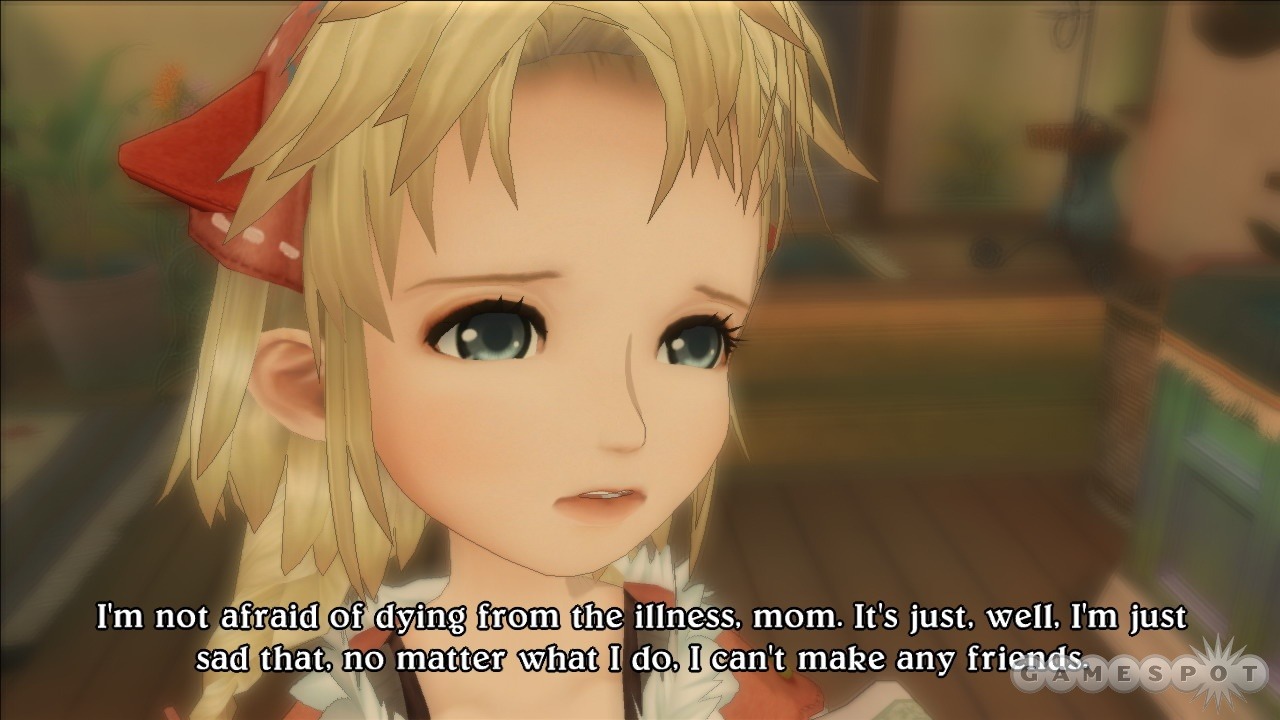 Aside from some uncanny-valley-esque eye movements, the characters show a ton of emotion through their faces alone.
Aside from some uncanny-valley-esque eye movements, the characters show a ton of emotion through their faces alone.
Needless to say, this game absolutely nails its presentation. While not every second of Eternal Sonata is perfect (in particular, some of its monologues are a little too self-indulgent), its art design, sound, and animations are immensely enjoyable. This is important because, like Symphonia, Eternal Sonata spends a lot of its time in cutscenes.
Eternal Sonata is at its best when its free to flex its artistic muscles, but suffers from some of the same gameplay problems that Symphonia does. Its dungeon designs, for example, tend to be narrow, linear passages that force the player through enemies that spawn a little too often. This is compounded by the fact that, despite being enjoyable at face-value, the game's battles last a little too long.
To be clear, the game's battle system is fun: I enjoyed unlocking new abilities for each of the game's characters, and I was eager to try them out in battle. In addition, the battle system's mechanics actually change (i.e. get harder but more rewarding) as you progress, which helps keep things fresh. But during long play sessions and especially in dungeons, the game's battles will likely start to wear on the player. Symphonia fares better in this regard because of its real-time nature: there's no downtime when in battle, and this makes the player feel engaged and entertained for the battle's entirety.
Eternal Sonata, on the other hand, forces you to sit through each enemy's turn, which can sometimes lead to waiting periods of over 30 seconds. This isn't a problem when the enemy encounter rate is manageable, but in dungeons, battles will probably start grating on the player's nerves. Therefore, like Symphonia, Eternal Sonata dungeons are inconvenient at best and a time-consuming chore at worst.
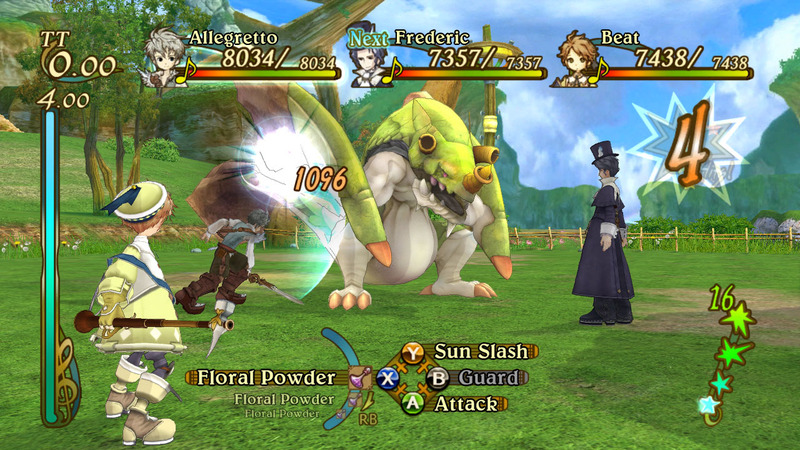 Eternal Sonata's turn-based battle system is fun, but there's a lot of downtime to endure as enemies take their turns.
Eternal Sonata's turn-based battle system is fun, but there's a lot of downtime to endure as enemies take their turns.
Also like Symphonia, Eternal Sonata's dialog is a little wonky, and its script is also too "on-the-nose" (the opening cutscene flat-out asks the player "can we really distinguish between dreams and reality"). Lines that may have read fine in the script sound very stilted and unnatural when spoken out loud by voice actors that sometimes struggle to convey the appropriate tone.
Eternal Sonata is also extremely linear, perhaps even more so than Symphonia. But unlike Symphonia, Eternal Sonata has a "hook": I was eager to power through dungeons so that I could experience more of the game's presentation: the Chopin history lessons, the game's landscapes and vistas, the entertaining cutscenes and animations, and the wonderful music were significant enough motivators for me to trudge through the game's weaker moments. Unlike Symphonia, which I begrudgingly finished and felt very little at the game's conclusion, I felt a lot of things by the time I finished Eternal Sonata. I felt a sense of relief, gratitude, hope, and even sadness.
I don't mean to say that I wish the game was longer: it was neither too short nor too long. Rather, my point is that the game expertly juxtaposes life, death, love, heartache, nostalgia, and pain with its story to complement the bittersweet tones of Chopin's music. To that end, this game succeeds in chronicling the life of Chopin, the brilliant Polish composer, as well as Chopin, the young man who lived a tumultuous life and died too early.
I often judge a game's story by one simple metric: how much am I thinking about it in the days/weeks after I finish it? For Symphonia, not at all. For Eternal Sonata? At least a few days, if not a week or so. This metric speaks volumes about Eternal Sonata's success at creating a captivating, memorable experience.
Before I get ahead of myself and call Eternal Sonata a masterpiece (it's not), I'll leave it at this: it's a game that, despite it's flaws, succeeds at what it sets out to do. If you have even a slight appreciation for art and/or music, then you owe it to yourself to give this game a chance. At the very least, if you've become bored with this decade's endless sea of looter-shooters and empty open-worlds (excluding Breath of the Wild, as that game is a masterpiece) and are looking for something different, I'd recommend Eternal Sonata as a pleasant palette cleanser.
My Rating: 4 Creepy, yet Beautiful, Anime Eyes out of 5.
Comment Policy: no flamewars or trolling. Just have fun and be nice!
